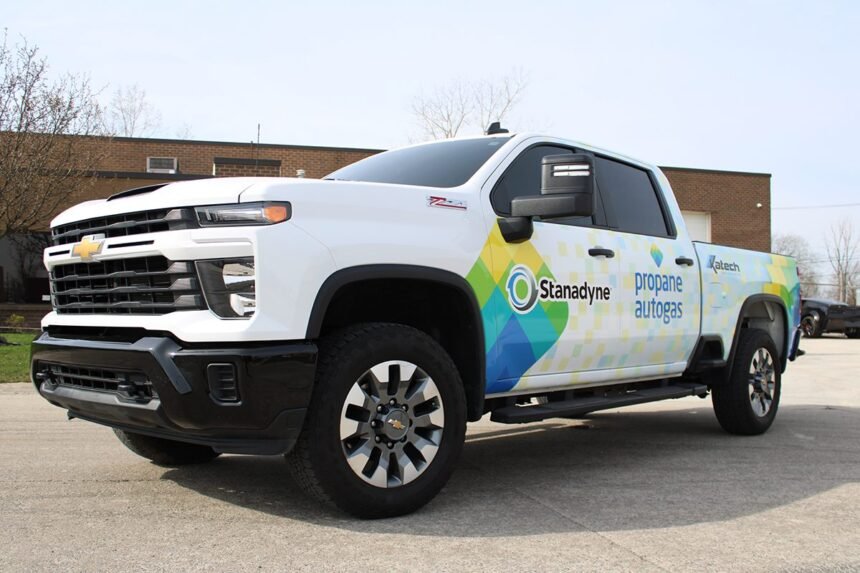Over the last four decades, propane autogas has earned a reputation for clean, reliable transportation. In that time, equipment emerged that raised the bar for its trusted performance. Now, breakthrough technologies are coming to market that will usher propane autogas into a new era of innovation.
From a new direct-injection fuel system created by Stanadyne to a propane-powered step van chassis for delivery applications by Blue Bird, and NEXIO’s latest line of propane-powered vehicles, propane autogas is evolving in many ways to benefit fleet owners. When fueled by renewable propane, these new innovations will move the transportation industry further down the path to zero emissions.
Performance and Efficiency Gains with Stanadyne Direct Injection Technology
With some alternative fuels, fleet owners are often left choosing between performance and reduced emissions. But propane autogas can meet both needs with Stanadyne’s new direct-injection fuel system developed in partnership with Katech and the Propane Education & Research Council. This new technology is designed to deliver performance, efficiency, and reduced emissions.
It combines Stanadyne’s direct-injection fuel pump with vapor lock technology and injector system with Katech’s vapor lock inhibitor to create the industry’s first medium-duty engine capable of delivering propane autogas up to 200-bar pressure directly into the combustion chamber. When integrated into a Chevrolet Silverado’s 6.6L V8 L8T engine, the system produces 401 horsepower, 464 lb-ft of torque, and enables a towing capacity of up to 17,370 lbs. The system will deliver the kind of performance more commonly associated with gasoline or diesel, and it will be ideal for fleet owners that need to prioritize power and performance alongside emissions reductions.
The new technology will also help fleet owners exceed the ultra-low emissions mandates going into place in 2027. Compared to diesel, propane autogas reduces harmful nitrogen oxide emissions by 96 percent and provides a five to ten percent reduction in carbon dioxide emissions.
Stanadyne is piloting this technology in 2025 with anticipated production in 2026.
Expanding Options with Blue Bird’s Propane Step Van Chassis
Some fleet owners may already recognize Blue Bird from its reputation as a trusted provider of tens of thousands of propane-powered school buses that are currently on the road today. But now, Blue Bird and ROUSH CleanTech are bringing that safe, reliable, and powerful performance to the delivery market with a Class 5-6 propane-powered step van chassis. The vehicle is designed to meet the needs of high-mileage, stop-and-go fleet operations, like those for last-mile delivery.
The platform is built on a Ford 7.3L V8 engine powered by ROUSH’s propane autogas fuel system. It is engineered for medium- to long-range delivery routes with a gross vehicle weight rating (GVWR) of up to 23,000 pounds. It’s an ideal fit for market verticals like package and parcel delivery, beverage distribution, and other applications where payload and uptime are critical to operations. Additionally, fleet owners that adopt the new step van will experience lower fuel and maintenance costs than diesel.
The new chassis will also address some of the most common limitations associated with electric step vans. With propane autogas, there’s no need to compromise on range, payload, or refueling times. Instead, drivers can expect a refueling process like gasoline or diesel and a range of up to 400 miles before needing to refuel, allowing them to stay on the road and reduce downtime.
Blue Bird anticipates the propane-powered step van to be available in mid-2026.
Purpose-Built Propane Vehicles from NEXIO
Fleet owners looking for a powerful, lower-emissions alternative to diesel now have a new solution from NEXIO. The company has unveiled a supercharged propane autogas engine, purpose-built for medium- and heavy-duty applications starting with a new line of propane-powered bobtail trucks. This is not a conversion, but an engine designed for propane autogas from the outset.
The 7.2L Supercharged V8 propane autogas engine provides diesel-like performance with 330 horsepower at 2,400 RPM and 775 ft-lbs of torque at 1,900 RPM. Engineered with a high-strength iron block, propane-specific valvetrain, and a liquid propane injection system, the engine is durable, efficient, and clean. According to NEXIO, it will deliver some of the lowest emissions in the medium-duty market as an ultra-low NOx engine that will meet or exceed EPA and CARB regulations to give fleet owners a path to decarbonization without compromising on power or range.
The base vehicle platform, including the chassis, axles, and transmission, has been tried and tested across Europe, and the engine itself has already been in use in the European market since 2020. In the United States, the engine will first be available in a new line of propane-powered bobtail trucks built specifically for the propane industry.
NEXIO also plans to offer the engine in Class 7 and 8 tractor configurations, as well as in a stripped chassis platform for a wide range of vocations, including walk-in vans, parcel delivery trucks, and other performance-driven applications where uptime is critical.
To support production of these vehicles, NEXIO will break ground later this year on a new manufacturing facility in Lufkin, Texas, which will bring 300 long-term jobs to the area. The new facility will serve as the company’s U.S. corporate and production headquarters.
Next Level Sustainability with Renewable Propane
While most of the new innovations are centered on vehicle technology, the propane industry has also been hard at work to develop cleaner energy options like renewable propane. Produced from a variety of renewable feedstocks such as used cooking oil, animal fats, and plant oils, renewable propane provides the same trusted performance as conventional propane but with even lower carbon emissions compared with other energy sources. At the point of combustion, renewable propane’s carbon intensity is up to five times lower than diesel and four times lower than conventional propane.
Unlike other low-carbon fuels that may require specialized equipment or infrastructure upgrades, renewable propane is a drop-in solution for propane autogas. It’s chemically identical to conventional propane, so it works seamlessly with existing propane autogas vehicles, refueling infrastructure, and maintenance operations without the need for special conversions or upgrades. That means fleets already running on propane autogas can reduce emissions immediately, and those considering a transition can adopt propane autogas technology today to start reaping the benefits of renewable propane from day one.
Fleets across the country are already using renewable propane in school transportation, paratransit, and corporate fleets. As the transportation industry moves toward cleaner options, renewable propane gives fleet managers a cost-effective solution for reducing carbon emissions down the path to zero.
A Smarter Path to Zero
The path to zero emissions isn’t one-size-fits-all. Fortunately, the propane industry is stepping up with practical, scalable solutions. For fleet owners looking to make smart energy decisions, propane autogas continues to offer a compelling mix of performance, affordability, and reduced environmental impact with new technologies pushing the possibilities even further. Visit propane.com/fleet-vehicles to see how propane autogas can integrate into your fleet.
Joel Stutheit is the senior manager of autogas business development at the Propane Education & Research Council. He can be reached at joel.stutheit@propane.com.











